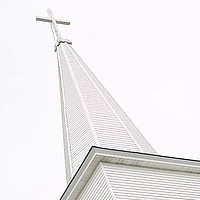
Matthew 16:18 “And I say unto thee, That thou art Peter, and upon this rock I will build my church; and the gates of hell shall not prevail against it”
“I will build my Church”—not on the man Simon-Barjona; but on him as the heavenly-taught confessor of a faith. "My Church," says our Lord, calling the Church His OWN
“and the gates of hell—"of Hades," or, the unseen world; meaning, the gates of Death: in other words, "It shall never perish.”
The Greek word ekklesia originally referred to an assembly of people summoned together. In the new Testament ekklesia is translated “church” and designates the congregation of God’s people in Christ, who are called together as citizens of God’s kingdom (Eph 2:19) for the purpose of worshipping God. The word “church” can refer to a local church (Matt 1817; Acts 15:4), or the universal church (Matthew 16:18; Acts 20:28; Eph 2:21-22).
In the New Testament it is the translation of the Greek word ecclesia, which is synonymous with the Hebrew kahal of the Old Testament, both words meaning simply an assembly.
We find the word ecclesia used in the following senses in the New Testament:
(1.) It is translated “assembly” in the ordinary classical sense (Acts 19:32, 39, 41).
(2.) It denotes the whole body of the redeemed, all those whom the Father has given to Christ, the invisible catholic church (Ephe. 5:23, 25, 27, 29; Hebrews 12:23).
(3.) A few Christians associated together in observing the ordinances of the gospel are an ecclesia (Romans 16:5; Col. 4:15).
(4.) All the Christians in a particular city, whether they assembled together in one place or in several places for religious worship, were an ecclesia. Thus all the disciples in Antioch, forming several congregations, were one church (Acts 13:1); so also we read of the “church of God at Corinth” (1 Cor. 1:2), “the church at Jerusalem” (Acts 8:1), “the church of Ephesus” (Rev. 2:1), etc.
(5.) The whole body of professing Christians throughout the world (1 Cor. 15:9; Galatians 1:13; Matthew 16:18) are the church of Christ.
Relation Between Christ and the Church. Seven New Testament figures describe this relationship: (1) the Shepherd and the Sheep (John 10); (2) the Vine and the Branches (John 15); (3) the Cornerstone and the Stones of the Building (1 Cor. 3:9; Eph. 2:19-22; 1 Peter 2:5); (4) High Priest and the Kingdom of Priests (Hebrews 5:1-10; Hebrews 6:13-8:6; 1 Peter 2:5-9; Rev. 1:6); (5) the Head and the many-membered Body (1 Cor. 12:12-13, 27; Eph. 4:4); (6) the Last Adam and the New Creation (1 Cor. 15:22, 45; 2 Cor. 5:17); (7) the Bridegroom and the Bride (John 3:29; 2 Cor. 11:2; Eph. 5:25-33; Rev. 19:7-8).
The Unity of the Church. John 17:11, 20-23 describe the outpouring of the Holy Spirit at Pentecost and the Spirit’s arrival to baptize all who believe in Christ into one Body. Christian unity is thus a reality—a position as a result of being “in Christ.”
According to the New Testament definition the church is the Body of Christ of which He is the head (Eph. 1:22-23), being a holy temple for the habitation of God through the Spirit (Eph. 2:21-22), “one flesh” with Christ (Eph. 5:30-31), and espoused to Him as a pure virgin to one husband (2 Cor. 11:2-4).
The mission of the Church. First, the mission is God’s mission, and God will fulfill his purpose. God promises us that the time is coming when “at the name of Jesus every knee should bow, in heaven and on earth and under the earth, and every tongue confess that Jesus Christ is Lord, to the glory of God the Father” (Phil. 2:10-11). Jesus promised, “I will build my church, and the gates of Hades will not overcome it” (Matthew 16:18). Our confidence is in God’s faithfulness and power, not in our own efforts.
The church is the temple of God and the Holy Spirit. The Holy Spirit empowers and renews the church. Each local church is a manifestation in time and place of the heavenly church to which all believers presently belong (Eph. 1:22; Eph 3:10; Eph. 5:22-30; Col. 1:18, 24). This is because we are raised with Christ and seated with him in the heavenly places (Eph. 2:6; Col. 3:1).
As members of God’s Church, we are to “be kind and compassionate, . . . forgiving,” “be devoted to one another . . . honor one another,” “bear with each other” as well as “pray for each other” and “carry each other’s burdens” (Eph. 4:32; Romans 12:10; Col. 3:13; James 5:16; Galatians 6:1). We are to also show evidence of the fruit of the Spirit in our lives -as patience, gentleness, goodness and faithfulness (Galatians 5:22-23).
Church includes worship. Worship is something that believers should be engaged in wherever they are and whatever they are doing during the whole of their lives (Romans 12:1-2). It involves mission to those who drift into the church (1 Cor. 14:24-25) and also generates, supports and monitors mission to those who remain outside (Acts 13:1-3; Acts 14:27-28; Phil. 4:18).
The primary purpose of church is genuine community with God and one another.